The Theodore Roosevelt Cyclopedia is a comprehensive project to publish, in one collection, the significant sayings, important conversations and writings (less his letters) of the 26th President of the United States, Theodore Roosevelt. Originally conceived by Dr. Albert Bushnell Hart, a history professor at Harvard University, a personal friend of Roosevelt and member of the Roosevelt Memorial Association, now known as the Theodore Roosevelt Association, Hart's goal was, in his words, to "present in alphabetical arrangement, extracts sufficiently numerous and comprehensive to display all the phases of (Theodore) Roosevelt's activities and opinions as expressed by him." An A-Z online index of the original work is also maintained by the TRA. [1] The 1941 Cyclopedia is out of print, but was made available in a CD-ROM version in 1989, the 1989 version can be found online. [2]
Theodore Roosevelt, the 26th U.S. president, popularly known as "TR" and "Teddy" (although Roosevelt despised that name), died on January 6, 1919. Within a few days, the Roosevelt Memorial Association was founded by Roosevelt's friends and associates. The association was formally chartered by special act of Congress, May 31, 1920,
to perpetuate the memory of Theodore Roosevelt for the benefit of the people of the United States of America and the world....
Led in the years 1919–1957 by secretary and director Hermann Hagedorn (1882–1964), poet, author, historian, friend and biographer of Roosevelt, the association engaged in a wide spectrum of programs and activities to preserve his memory.
In the association's Annual Report 1924, Hagedorn announced that "a Roosevelt Cyclopedia or Roosevelt Thesaurus" was being edited by Professor Albert Bushnell Hart of Harvard University. Albert Bushnell Hart (1854–1943) was a classmate of Roosevelt's at Harvard, Class of 1880, and like Roosevelt, a Phi Beta Kappa. Hart received a Ph.D. degree at the University of Freiburg in Germany in 1883, and that same year joined the faculty of Harvard. He taught at Harvard 1883–1926. One of the first generation of professionally trained historians in the United States, a prolific author and editor of historical works, Albert Bushnell Hart became, as Samuel Eliot Morison says, "The Grand Old Man" of American history, looking the part with his "patriarchal full beard and flowing moustaches." Hart was a devoted friend and follower of Theodore Roosevelt, and was elected as a Roosevelt delegate to the Republican convention of 1912.
He became an enthusiastic trustee and supporter of the Roosevelt Memorial Association, and said that from the time of Roosevelt's death he had the idea of editing a Roosevelt-centered cyclopedia. The projected reference work would, Hart explained, "present in alphabetical arrangement extracts sufficiently numerous and comprehensive to display all the phases of Roosevelt's activities and opinions as expressed by him." He wrote Hagedorn: "What we are after is the crisp, sharp, biting sparks that flew from the Roosevelt brain." Hart told the survivors of the Harvard Class of 1880 that editing the cyclopedia "will be a very interesting and agreeable service to the memory of our great classmate."
But from the beginning the project was plagued with problems. Hart's time was taken up with other commitments. He was editor of the American Year Book, 1926–1932, edited a five-volume history of Massachusetts in 1927–1930, and worked as the official historian of the George Washington bicentennial commission in the 1920s and 1930s. Hart had to postpone the cyclopedia, and asked the association for research and clerical staff.
But the executive committee of the Roosevelt Memorial Association delayed appropriations for the cyclopedia, because the expense was "so great," and it was not until May 1928 that a budget was approved for the cyclopedia, although the project had been publicly announced years before. Finally, in 1931 Hart presented a rough draft of the cyclopedia to Hagedorn. But the book needed much more work. By now the elderly Hart "began to decline," wrote Samuel Eliot Morison; and Hagedorn reported to the RMA Executive Committee that Hart could not finish the project "because of his advanced years."
In 1939, Hagedorn assigned the cyclopedia to Herbert Ronald Ferleger (1914–1973), a graduate student and professional researcher who had done work for the association. Ferleger, who graduated from Temple University in 1934, had been a research fellow at the Brookings Institution, and had taught at Princeton. He received a Ph.D. in political science from Columbia University in 1942. Ferleger completed his work in 1940. William Allen White (1868–1944), the editor of the Emporia Gazette, Emporia, Kansas, a respected and beloved public figure and a trustee of the association who had been a close friend of TR's, wrote a foreword for the book.
On January 6, 1941, the Theodore Roosevelt Cyclopedia was published by the association. The total costs to the RMA from 1928 to 1941 in salaries, printing, and other expenses came to $22,509.52. In the final analysis, The Theodore Roosevelt Cyclopedia represented the vision and plan of Albert Bushnell Hart, the dedication and patience of Hermann Hagedorn, and the research and hard work of Herbert Ronald Ferleger.
Lawrence F. Abbott, who worked with TR when the former president was contributing editor of the Outlook magazine, once estimated that Roosevelt published perhaps 2,500,000 words, and wrote a total of maybe 18,000,000 words when his letters are included in the count. About 550,000 words are in the Theodore Roosevelt Cyclopedia.
The Theodore Roosevelt Cyclopedia, published in 1941, consists of 674 pages with well over 4,000 quotations arranged alphabetically by topic or subject, from "Abbey Theatre" to "Youth." Thousands of topics and subjects are listed, counting the extensive cross-reference entries. The original source of each quotation is given, and if the passage appears in the Charles Scribner's Sons editions of the Works of Theodore Roosevelt (1923–1926), volume and page numbers are listed for the National (20 volumes) and/or Memorial (24 volumes) editions. A guide or chart for the Scribner's Memorial and National editions is provided in the "Editors' Note" at the beginning of the Cyclopedia, listing the basic contents of each volume.
Most of the quotations are taken from the Scribner's editions of the Works of Theodore Roosevelt, but approximately 380 quotations in the Cyclopedia, not counting excerpts from letters, are from articles, speeches, and other sources not included in the Scribner's editions. Additionally, over forty recorded conversations are quoted, most of these not in the Scribner's editions. The editors of the Cyclopedia, Albert Bushnell Hart and Herbert Ronald Ferleger, unfortunately, did not make use of the unpublished letters in the Theodore Roosevelt Papers at the Library of Congress or of other collections of unpublished papers. And the eight-volume Letters of Theodore Roosevelt, based on the Theodore Roosevelt Papers at the Library of Congress and other collections, came out in the 1950s, and therefore was not available to the editors.
Only one unpublished letter is quoted in the Cyclopedia: TR to the Rev. William W. Moir, October 10, 1898, pp. 534–535, explaining how to pronounce the name Roosevelt. Fortunately, however, many published TR letters were available to the editors in the 1920s and 1930s, most notably in Theodore Roosevelt's Letters to His Children (1919), covering the years 1898–1911, edited by Joseph Bucklin Bishop, included in both Scribner's National and Memorial editions; Letters from Theodore Roosevelt to Anna Roosevelt Cowles, 1870-1918 (1924); Selections from the Correspondence of Theodore Roosevelt and Henry Cabot Lodge, 1884-1918 (1925), two volumes; My Brother Theodore Roosevelt (1921) by Corinne Roosevelt Robinson ; and Theodore Roosevelt and His Time, Shown in His Letters (1920), two volumes, by Joseph Bucklin Bishop, included in the Memorial edition.
Bishop, whose biography had been authorized by TR before the former President's death, had complete access to what became the collection of Theodore Roosevelt Papers at the Library of Congress. Over 670 quotations in the Cyclopedia are from letters by Roosevelt.
The topics and subjects included in the Theodore Roosevelt Cyclopedia cover the full range of TR's activities and opinions. Issues of TR's times, like "Silver Issue," "Recall of Judicial Decisions," and "Trust Legislation," and periods and events in Roosevelt's career, such as "New York Assembly-Roosevelt's Service in," "Governor of New York," and "Roosevelt's Reception in Europe" (1910), are listed in the Cyclopedia. Roosevelt's views on the historical events of his era, such as "Spanish–American War," "Russo-Japanese War," "Panic of 1907" and "Election of 1916," are given.
Some 149 people are listed as subjects in the Cyclopedia, from historical figures before TR's times, like Oliver Cromwell, Frederick the Great, and John Marshall, to Roosevelts's contemporaries, including Jane Addams, William Jennings Bryan, Mark Hanna, Augustus Saint-Gaudens, Pancho Villa, Woodrow Wilson and Booker T. Washington. Roosevelt's comments on writers are given, from Dante to Dickens to Edwin Arlington Robinson.
Institutions, groups, and organizations, such as the Methodist Church, Mugwumps, Y.M.C.A., U.S. Senate, Audubon Societies, and Progressive Party, are listed. Birds and animals—ousel, wapiti, elephant, mocking-bird, moose, and many others—are described in the words of the hunter-naturalist TR. Historical topics from before Roosevelt's era are covered, including the fall of the Roman Empire, the Mongol Invasions, the French Revolution, and the War of 1812. Many of the entries in the Cyclopedia are general topics, like "citizenship," "experts in government," "ideals," "reading," "tolerance," "women in politics," and "scholarship." Other entries are specific references, such as "Socialism in Sweden," "Standard Oil Company, "Bryce's American Commonwealth," and "Northern Securities Case."
Theodore Roosevelt was a great phrase-maker and coiner of terms, and most of his famous slogans, epithets, titles, sayings, and characterizations are listed in the Cyclopedia, including "lunatic fringe," "Square Deal," "malefactors of great wealth," "Big Stick," "muck-rakers," "Bull Moose," "nature fakers," "polyglot boarding house," "weasel words," "New Nationalism," "broomstick preparedness," and "strenuous life." A few others, however, are not in the Cyclopedia, such as "Ananias Club" (liars) and "bully pulpit" (the White House).
Unfortunately, the editors made no systematic attempt to trace or indicate the origin and first use of a term or phrase. The earliest use is often given, but not in all cases. This failure to include notes on the history of phrases and terms is a real limitation in the Cyclopedia as a reference work. The editors were clearly more interested in presenting Roosevelt's thought than in producing a guide to familiar quotations, though most of the famous quotations were included in the book. The quotations given are often lengthy, thereby preserving much of the original context, and providing an accurate view of Roosevelt's thinking.
Usually quotations on a topic are taken from a variety of sources over a period of many years, thus showing the development and the remarkable degree of continuity in TR's thought. In some cases, the quotations selected do not give the full scope of Roosevelt's opinions on a particular subject. For instance, only favorable remarks are quoted for William McKinley and M. La Follette Sr., whereas TR was also critical of both leaders, particularly Senator La Follette. But on most subjects an accurate, balanced, and full picture of TR's thinking is given. For instance, the quotations on William Howard Taft show TR's changing views of a man who was at one time a close friend and associate and later a political opponent.
Likewise, the coverage of the Panama Canal is thorough. Many of the remarks quoted are candid and colorful, and the private as well as the public Roosevelt is revealed in the Cyclopedia. Anyone familiar with TR's words will probably regret that some particular quotations were not included in the Cyclopedia. But on the whole, the editors did an excellent job in selecting quotations that show the totality of the many-sided Roosevelt.
The chief weaknesses of the Cyclopedia are, as noted, that the editors did not use the then unpublished letters by TR, and did not trace the roots or indicate the first uses of famous phrases and key concepts. The strengths of the Theodore Roosevelt Cyclopedia are many. The choice of topics and subjects is almost exhaustive of the possibilities. The book is thoroughly cross-referenced. The editors used a wide variety of sources, from speeches and state papers to recorded conversations and letters to family members, from little-known articles to Roosevelt's numerous books. The quotations given are for the most part well-chosen, and care was taken to present views on a particular topic expressed over a wide span of time, and to give a full and accurate summary of Roosevelt's thought.
No attempt was made to tailor Roosevelt's views to fit the ideological fashions of later periods. Roosevelt "in his miraculous abundance," as William Allen White said, is found in the Cyclopedia. The editors indeed accomplished their stated purpose: to present in one volume "the essence of Theodore Roosevelt-the ideals, principles, and convictions for which he lived; the thoughts, views, and opinions he expressed on a multitude of issues." The Theodore Roosevelt Cyclopedia is a valuable scholarly work that will remain of use as long as anyone is interested in him.
The Cyclopedia is now available in CD format and there is a primitive online version of the work at the Theodore Roosevelt Association's web site. There is ongoing discussion on updating that Web publication into a full-featured web-enabled system.
Ongoing discussion is taking place both at the Harvard's Houghton Library, the Theodore Roosevelt Association and at Dickinson State University [3] Dickinson State TR papers digitization project for information on the digitizing of Roosevelt's papers, correspondence, articles, and photos.

Lyman J. Abbott was an American Congregationalist theologian, editor, and author.

Theodore Roosevelt Jr., often referred to as Teddy or by his initials, T. R., was an American politician, statesman, conservationist, naturalist, and writer who served as the 26th president of the United States from 1901 to 1909. He previously held various positions in New York politics, rising up the ranks to serve as the state's 33rd governor for two years. He later served as the 25th vice president under President William McKinley for six months in 1901, assuming the presidency after McKinley's assassination. As President, Roosevelt emerged as a leader of the Republican Party and became a driving force for anti-trust and Progressive policies.
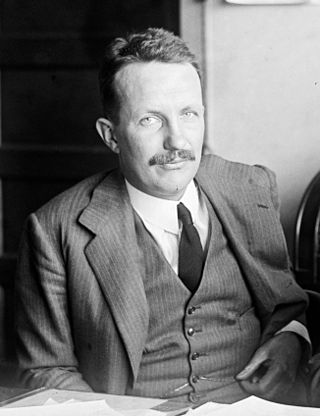
Kermit Roosevelt Sr. MC was an American businessman, soldier, explorer, and writer. A son of Theodore Roosevelt, the 26th President of the United States, Kermit graduated from Harvard College, served in both World Wars, and explored two continents with his father. He fought a lifelong battle with depression and died by suicide while serving in the US Army in Alaska during World War II.

George von Lengerke Meyer was a Massachusetts businessman and politician who served in the Massachusetts House of Representatives, as United States ambassador to Italy and Russia, as United States Postmaster General from 1907 to 1909 during the administration of President Theodore Roosevelt and United States Secretary of the Navy from 1909 to 1913 during the administration of President William Howard Taft.
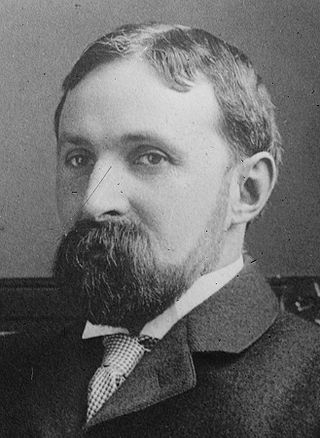
Albert Bushnell Hart was an American historian, writer, and editor based at Harvard University. One of the first generation of professionally trained historians in the United States, a prolific author and editor of historical works, Albert Bushnell Hart became, as Samuel Eliot Morison described him, "The Grand Old Man" of American history, looking the part with his "patriarchal full beard and flowing moustaches."
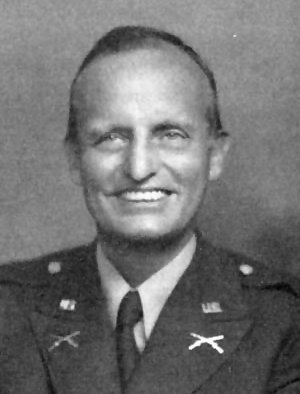
Archibald Bulloch Roosevelt was a distinguished U.S. Army officer and commander of U.S. forces in both World War I and II, and the fifth child of U.S. President Theodore Roosevelt. In both conflicts he was wounded. He earned the Silver Star with three oak leaf clusters, Purple Heart with oak leaf cluster, and the French Croix de Guerre. After World War II, he became a successful businessman and the founder of a New York City bond brokerage house, as well as a spokesman for conservative political causes.

Horace Bushnell was an American Congregational minister and theologian.

John Hall Wheelock was an American poet. He was a descendant of Eleazar Wheelock, founder of Dartmouth College. The son of William Efner Wheelock and Emily Charlotte Hall, John Hall Wheelock was born in Far Rockaway, New York, and brought up in the neighborhood now occupied by Rockefeller Center. He summered in a family home on Long Island's South Fork, which provided inspiration for much of his work.
The Theodore Roosevelt Association (TRA) is a historical and cultural organization dedicated to honoring the life and work of Theodore Roosevelt (1858–1919), the 26th President of the United States.
Hermann Hagedorn was an American author, poet and biographer.
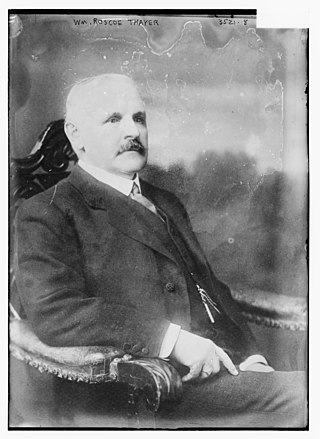
William Roscoe Thayer was an American author and editor who wrote about Italian history.

Helen Churchill Candee was an American author, journalist, interior decorator, feminist, and geographer. Today, she is best known as a survivor of the sinking of RMS Titanic in 1912, and for her later work as a travel writer and explorer of southeast Asia.
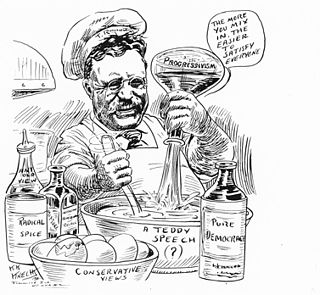
Theodore Roosevelt (1858–1919) was the 26th President of the United States (1901–1909) and also served as Governor of New York and Vice President. He is known for becoming a leading spokesman for his version of progressivism after 1890. However, author Daniel Ruddy argues in his book Theodore the Great: Conservative Crusader that Roosevelt was actually a "populist conservative" and a "Hamiltonian"—a conservative in the eighteenth century sense of the word. Similarly, Francis Fukuyama identifies Roosevelt, together with Alexander Hamilton, as part of a tradition of a strong-state conservatism in the United States.

Joseph Bucklin Bishop, was an American newspaper editor (1870–1905), Secretary of the Isthmian Canal Commission in Washington, D.C., and Panama (1905–1914), and authorized biographer and close friend of President Theodore Roosevelt. Bishop was the author of 13 books and dozens of magazine articles, and he edited the 1920 best-seller, Theodore Roosevelt’s Letters to His Children.

The Theodore Roosevelt Digital Library is a repository of information on Theodore Roosevelt. It is online.

This Theodore Roosevelt bibliography lists the works written by Theodore Roosevelt. Roosevelt was a diligent and skilled writer. When he lost his fortune in the Dakota Territory in 1886 and needed to make a living to support his family, he did so for the rest of his life by writing. Roosevelt wrote on a wide range of topics and genres, including history, autobiography, biography, commentary and editorials, memoirs, nature, and guide books. In addition, by one estimate Roosevelt wrote more than 150,000 letters. In his style, Roosevelt could be strong, introspective, exuberant, or angry—the subject dictated the style.
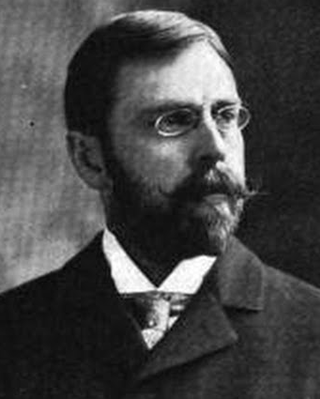
Herman Vandenburg Ames was an American legal historian, archivist, and professor of United States constitutional history at the University of Pennsylvania and, from 1907 to 1928, dean of its graduate school. His 1897 monograph, The Proposed Amendments to the Constitution of the United States During the First Century of Its History, was a landmark work in American constitutional history. Other works by Ames included John C. Calhoun and the Secession Movement of 1850, Slavery and the Union 1845–1861, and The X.Y.Z. Letters, the latter of which he authored with John Bach McMaster. Among his notable students were Ezra Pound, John Musser, and Herbert Eugene Bolton.
This bibliography of Theodore Roosevelt is a list of published works about Theodore Roosevelt, the 26th president of the United States. The titles are selected from tens of thousands of publications about him.
Richard Peter Harmond was an American historian, author, and educator, who specialized in the history of the American Gilded Age, as well as the history of technology and the environment.